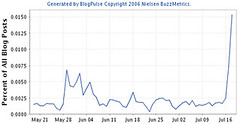"I sincerely apologize to all Whole Foods Market stakeholders for my error in judgment in anonymously participating on online financial message boards,” says co-founder, Chairman and CEO John Mackey, Whole Foods Market, Inc. “I am very sorry and I ask our stakeholders to please forgive me."
With the lead up to his apology and the very limited number of people he apologized to, I’m not sure this was the best decision, but the fact that this decision was made means fun time is indeed over. Given the possibility that Mackey did not act alone (or at least was not anonymous to everybody who perused Yahoo financial chat boards) while playing the part of the great masked Wild Oats stock vandal, “rahodeb,” it might be for the best. Will it work? Probably not.
Make no mistake, the Whole Foods Market, Inc. board retaining the firm of Munger, Tolles & Olson LLP to advise it during an independent internal investigation means that the damage down the road may very likely exceed “rahodeb” having fun at the expense of others. (The SEC began its investigation the day before.)
While there may be many revelations made during the internal investigation (let alone the SEC investigation), the need to investigate seems to mean: more people may have been involved (it’s hard to keep a secret identity secret for that long without sharing) or they feel a need to analyze whether any of Mackey’s comments did in fact impact Wild Oats stock at any time (online or off). Even more obvious, Whole Foods Market, Inc. wants to apply one of the few “golden no comment” clauses that most journalists respect.
"The Company intends to fully cooperate with the SEC and does not anticipate commenting further while the inquiry is pending." ... "The Board will refrain from comment until the internal investigation is completed."
Why does the “golden no comment” clause work? From a communication perspective, provided the board doesn’t start to squawk, refraining from comment during an investigation gives the company a badly needed pause in its communication, which to date, can be likened to someone hemorrhaging at the mouth. To be clear, the board is concerned about something enough that they feel it is prudent to censor their outspoken CEO for fear it will get worse before it gets better. Most journalists will respect such restraint provided it holds.
Why doesn’t the “golden no comment” clause work? Once a company issues the statement that silence is golden during an investigation, reporters have a nasty habit of looking for anyone and everyone for input and opinion. It almost assuredly increases speculation 100-fold because journalists can no longer turn to the primary source and they have to go out and look for new sources. There is also the risk of someone developing a Deep Throat complex and leaking information to the media, whereby the company won’t be able to respond to any of it unless it gives up its communication blackout. And once you give it up, it’s not fair to ask for it back.
There are other major downsides to applying “no comment during an investigation,” including: all other company news becomes irrelevant (you can’t effectively talk about produce in the room but skip the part where the elephant ate half of it); it makes the company look like there really is a fire under all that smoke (whether there is or not); and, finally, most importantly, it contradicts the concept that someone always talks (because they almost always do).
So, given the company's statements, we have moved from “whole” truths to “no” truths in the case study of Mackey and Whole Foods Market, Inc. Or perhaps, more appropriately, since others are ready to pick up where Mackey left off, we have entered the spin zone where there will be ample hot air about how it’s unfair to comment on a CEO because, as Laura Goldman submits, “I checked with lawyers and confirmed that the postings themselves are not illegal.”
With no disrespect intended, Ms. Goldman is right that this incident should not undo all the good work Mackey has done nor does it invalidate Whole Foods Market, Inc. as a viable company. However, even Journalism 101 students know that you can always find ample lawyers to argue either side of a case. Heck, that’s what makes court reporting sensational enough to have plenty of programming.
Besides, I think journalists and stock traders have been surprisingly kind to Mackey; it’s the public relations and communication people who seem to want his head the most (I’m in the minority by not asking for it, though I think he may have lost it anyway with the apology). Unfortunately for Mackey, I also think the split opinion over his fate will solidify in time; the reactive silence will point most in one direction.

With the lead up to his apology and the very limited number of people he apologized to, I’m not sure this was the best decision, but the fact that this decision was made means fun time is indeed over. Given the possibility that Mackey did not act alone (or at least was not anonymous to everybody who perused Yahoo financial chat boards) while playing the part of the great masked Wild Oats stock vandal, “rahodeb,” it might be for the best. Will it work? Probably not.
Make no mistake, the Whole Foods Market, Inc. board retaining the firm of Munger, Tolles & Olson LLP to advise it during an independent internal investigation means that the damage down the road may very likely exceed “rahodeb” having fun at the expense of others. (The SEC began its investigation the day before.)
While there may be many revelations made during the internal investigation (let alone the SEC investigation), the need to investigate seems to mean: more people may have been involved (it’s hard to keep a secret identity secret for that long without sharing) or they feel a need to analyze whether any of Mackey’s comments did in fact impact Wild Oats stock at any time (online or off). Even more obvious, Whole Foods Market, Inc. wants to apply one of the few “golden no comment” clauses that most journalists respect.
"The Company intends to fully cooperate with the SEC and does not anticipate commenting further while the inquiry is pending." ... "The Board will refrain from comment until the internal investigation is completed."
Why does the “golden no comment” clause work? From a communication perspective, provided the board doesn’t start to squawk, refraining from comment during an investigation gives the company a badly needed pause in its communication, which to date, can be likened to someone hemorrhaging at the mouth. To be clear, the board is concerned about something enough that they feel it is prudent to censor their outspoken CEO for fear it will get worse before it gets better. Most journalists will respect such restraint provided it holds.
Why doesn’t the “golden no comment” clause work? Once a company issues the statement that silence is golden during an investigation, reporters have a nasty habit of looking for anyone and everyone for input and opinion. It almost assuredly increases speculation 100-fold because journalists can no longer turn to the primary source and they have to go out and look for new sources. There is also the risk of someone developing a Deep Throat complex and leaking information to the media, whereby the company won’t be able to respond to any of it unless it gives up its communication blackout. And once you give it up, it’s not fair to ask for it back.
There are other major downsides to applying “no comment during an investigation,” including: all other company news becomes irrelevant (you can’t effectively talk about produce in the room but skip the part where the elephant ate half of it); it makes the company look like there really is a fire under all that smoke (whether there is or not); and, finally, most importantly, it contradicts the concept that someone always talks (because they almost always do).
So, given the company's statements, we have moved from “whole” truths to “no” truths in the case study of Mackey and Whole Foods Market, Inc. Or perhaps, more appropriately, since others are ready to pick up where Mackey left off, we have entered the spin zone where there will be ample hot air about how it’s unfair to comment on a CEO because, as Laura Goldman submits, “I checked with lawyers and confirmed that the postings themselves are not illegal.”
With no disrespect intended, Ms. Goldman is right that this incident should not undo all the good work Mackey has done nor does it invalidate Whole Foods Market, Inc. as a viable company. However, even Journalism 101 students know that you can always find ample lawyers to argue either side of a case. Heck, that’s what makes court reporting sensational enough to have plenty of programming.
Besides, I think journalists and stock traders have been surprisingly kind to Mackey; it’s the public relations and communication people who seem to want his head the most (I’m in the minority by not asking for it, though I think he may have lost it anyway with the apology). Unfortunately for Mackey, I also think the split opinion over his fate will solidify in time; the reactive silence will point most in one direction.





















